democracynow.org
Stories:

Life, Animated: A Remarkable Story of How a Family Reached Their Autistic Son Through Disney Movies
Today we spend the hour with a young man with autism who learned to interact with the world in an unusual way. Owen Suskind was diagnosed with regressive autism when he was three years old. He stopped talking, and his family said Owen "vanished" within himself. He did not speak for years. Then his father, the Pulitzer Prize-winning journalist Ron Suskind, discovered a remarkable way to talk with his son involving characters from Owen’s favorite Disney films. Owen had memorized the lines to dozens of Disney films, and this discovery changed all of their lives, opening a new way for Owen to communicate. His story became the focus of Ron Suskind’s best-selling book, "Life, Animated: A Story of Sidekicks, Heroes, and Autism." Owen has since gone to college and now holds two jobs. Last year Owen, who is now in his twenties, even appeared on a Comedy Central special alongside the comedian Gilbert Gottfried who did the original voice of Iago the parrot in the Disney film "Aladdin." Now the story of Owen’s life has been turned into the documentary "Life, Animated," which just premiered at the Sundance Film Festival. In an extended interview, we feature excerpts from the film and speak with Owen Suskind, his father Ron and Roger Ross Williams, the film’s director, in Park City, Utah.
TRANSCRIPT
This is a rush transcript. Copy may not be in its final form.
AMY GOODMAN: We’re broadcasting from the Sundance Film Festival here in Park City, Utah. Today we spend the hour with a young man with autism who learned to interact with the world in an unusual way. His name is Owen Suskind. He was diagnosed with regressive autism at the age of three. He stopped talking. His father said Owen "vanished" within himself. He did not speak for years.
And then his dad, the Pulitzer Prize-winning journalist Ron Suskind, discovered a remarkable way to talk with his son involving characters from Owen’s favorite Disney films. Owen had memorized the lines of dozens of Disney films. This discovery changed all of their lives, opening a new way for Owen to communicate.
His story became the focus of Ron Suskind’s best-selling book, Life, Animated: A Story of Sidekicks, Heroes, and Autism. Owen has since gone to college and now holds two jobs. Last year, Owen, who is now in his twenties, even appeared on a Comedy Central special alongside the comedian Gilbert Gottfried, who did the original voice of Iago the parrot in the Disney film Aladdin.
GILBERT GOTTFRIED: Well, hello, Owen.
OWEN SUSKIND: Hello, Gilbert.
GILBERT GOTTFRIED: Owen, you like doing scenes from Aladdin, right?
OWEN SUSKIND: Uh-huh, I do.
GILBERT GOTTFRIED: You want to do one with me right now?
OWEN SUSKIND: Yes, I would.
GILBERT GOTTFRIED: Which scene?
OWEN SUSKIND: How about the lamp scene?
GILBERT GOTTFRIED: OK, let me see if I remember any of this. "I can’t believe it! I just don’t believe it! We’re never going to get a hold of that stupid plan! Just forget it! Look at this! I’m so ticked off, I’m molting!"
OWEN SUSKIND: "Patience, Iago, patience. Gazeem was obviously less than worthy."
AMY GOODMAN: The story of Owen Suskind’s life has been turned into the documentary Life, Animated, which just premiered here at the Sundance Film Festival to huge acclaim. The film is directed by Roger Ross Williams, the first African-American director to win an Academy Award. On Tuesday, I spoke to Owen Suskind, his father Ron and Roger Ross Williams here in Park City.
AMY GOODMAN: Owen, how did it feel to stand up at the Sundance Film Festival after a film about your life and to have people giving you a standing ovation, not for one minute, not for two minutes, not for five minutes—how many minutes did people stand and applaud you?
OWEN SUSKIND: A couple of great times. And I loved it.
AMY GOODMAN: How does it feel to have a film about your life?
OWEN SUSKIND: Feels wonderful, actually.
RON SUSKIND: Are you surprised at how good it feels?
OWEN SUSKIND: Yeah.
ROGER ROSS WILLIAMS: Owen has been thriving in front of an audience. He’s just—the audience loves Owen, and Owen loves the audience. And it’s just been a joy to see.
AMY GOODMAN: So, Roger, can you talk about why you decided to make this film and how it all happened?
ROGER ROSS WILLIAMS: Yeah. Ron and I have known each other for about 15 years. We worked together years ago on Nightline and PBS. And when Ron was working on the book, he approached me, and he said, "This is going to make a great film." And I jumped on it. You know, for me, I made a film called Music by Prudence about a Zimbabwean girl with severe disabilities, that won an Academy Award. And for me, it’s about championing the outsider, the other, telling the story of people that have been left behind. And Owen represents a whole vast population of people who have so much to offer us, and we’re losing out by leaving—by not recognizing the genius of people like Owen.
AMY GOODMAN: Owen, what does it mean to be autistic?
OWEN SUSKIND: It means you have special talents and skills inside you.
AMY GOODMAN: What are those talents?
OWEN SUSKIND: Oh, god. Being a good artist and a piano player and a good writer, author and storyteller, and possibly a good golfer and a great problem solver.
AMY GOODMAN: So each person is individual.
OWEN SUSKIND: Yeah, yeah.
AMY GOODMAN: And what is your special talent?
OWEN SUSKIND: Drawing animation, especially from Disney and Disney/Pixar.
AMY GOODMAN: Let’s take a step back, Ron Suskind, and talk about your life with your younger son, with Owen.
RON SUSKIND: Since the time Owen was about three, he gets whacked with autism. It’s late-onset autism, same as most [inaudible] kids who are born with it. But he’s chatting away at two, and then he vanishes at three, loses all speech.
AMY GOODMAN: What do you mean, he vanishes?
RON SUSKIND: Well, he stops speaking, and he won’t look at you. All the signs that you look for and fear as to autism, it just sort of suddenly comes upon him in a few months, right around the time he’s three years old. Cornelia and I, my wife, are just, you know, stunned. One of the things that we realize in this time of fear is that the thing he loves after the onset of the autism is similar to before: He loved the Disney animated movies. And over the years that follow, he speaks often in gibberish. You’re not sure what he’s saying. And right around the time that this clip occurs, we have a revelation, that he’s memorized 50 Disney animated movies as sound alone, and if you throw him a line, he throws you back the next line. That’s what I discover the night that I hold up the Iago puppet, which is the scene that I think you’re about to see.
OWEN SUSKIND: Yeah, yeah, yeah.
RON SUSKIND: Was that a big night for us?
OWEN SUSKIND: Yeah, yeah, sure.
RON SUSKIND: It’s the first time we talk since you were two years old.
OWEN SUSKIND: I am so happy. Love that night.
RON SUSKIND: Yeah, it was a great night.
AMY GOODMAN: Let’s go to a clip from Life, Animated.
OWEN SUSKIND: Why not? Uh-huh.
RON SUSKIND: So, I go up to his room. I see Owen on the bed flipping through a Disney book. And I see—sort of over to my left, I see Iago, the puppet. Now, Iago is the evil sidekick to the villain Jafar from Aladdin. Now, I know Owen loves this puppet.
IAGO: Jafar! Jafar! Get a grip!
RON SUSKIND: I grab the puppet, I pull it up to my elbow, and I begin to crawl across the rug as quietly as I can. And Owen turns to the puppet, like he’s bumping into an old friend. I say to him, "Owen, Owen, how does it feel to be you?"
OWEN SUSKIND: And I said, "Not good, because I don’t have any friends."
RON SUSKIND: Now, I’m under the bedspread, and I just bite down hard. You know? I just say to myself, "Stay in character." And I said, "OK, OK, Owen, when did you and I become such good friends?" And he said, "When I watched Aladdin, you made me laugh." And then we talk, Owen and Iago, for a minute, minute and a half. It’s the first conversation we’ve ever had.
AMY GOODMAN: So, that is the moment. Now, is it possible, Owen, that you remember when your dad was talking to you under the sheet with the puppet?
OWEN SUSKIND: Yeah, yeah, yeah.
RON SUSKIND: How did that feel?
OWEN SUSKIND: Felt good.
RON SUSKIND: I mean, we never had really talked before. It must have been strange for you to talk to Iago. You knew I was under the sheet, though, right?
OWEN SUSKIND: Yeah.
RON SUSKIND: But still, Iago, "Well, I don’t know."
OWEN SUSKIND: Ha! Love it.
RON SUSKIND: Then you spoke back to me in Jafar—Iago is the sidekick to the villain Jafar.
OWEN SUSKIND: You bet.
RON SUSKIND: And what did Jafar say back to Iago?
OWEN SUSKIND: "I love the way your foul little mind works."
RON SUSKIND: That was the—
OWEN SUSKIND: That’s our Disney buddy Jonathan Freeman.
RON SUSKIND: That was the next line of dialogue, and that’s when we knew, oh, my, we can converse in Disney dialogue. We couldn’t speak at that point. If you threw him a line, he’d throw you back the next line. Of course, he’d outrun you quick, because he had hundreds of hours in his head. And we started to speak in Disney dialogue as a way to communicate. We had no other way.
AMY GOODMAN: Now, before that, Owen had said a few things, and you thought he was really processing. But the doctor told you it was echolalia?
RON SUSKIND: Yeah. That’s a term of art for the idea that the kids just repeat what they hear as sound alone. They don’t understand mostly what they’re saying.
AMY GOODMAN: It’s echoing.
RON SUSKIND: Echoing, just like it says. And I said, "You mean like a parrot?" He’s like, "Kind of." I said, "Can he be understanding what the words mean?" He says, "Our sense"—this is 1994, '95—"we don't think he does." That went on for years, before you have this moment with Iago. Of course, we gave him every therapy. We had great therapists. And he—before he says this to Iago, he’s up to about a three-word sentence, says, "I want juice." That’s about all. But then there’s an explosion when we see he’s got this deep well of understanding, processing all the Disney movies.
OWEN SUSKIND: Yeah.
AMY GOODMAN: Wait. That word "juice"?
OWEN SUSKIND: It’s "just your voice."
AMY GOODMAN: OK. Explain this part, "just your voice."
OWEN SUSKIND: Yeah, yeah.
AMY GOODMAN: Why was this so important? How old were you when you said something that your parents did not quite understand?
OWEN SUSKIND: Three.
RON SUSKIND: Yeah, you were just shy of your fourth birthday. That’s right.
OWEN SUSKIND: Yeah.
AMY GOODMAN: And did you guys and your mom think you were asking for juice?
OWEN SUSKIND: Yeah, but it was really trying to read the dialogue from Little Mermaid.
RON SUSKIND: And what is the dialogue? So, this is one where Ariel is the mermaid, and she makes—has to make a trade to become human.
OWEN SUSKIND: Yeah.
RON SUSKIND: And the sea witch—
OWEN SUSKIND: Ursula.
RON SUSKIND: —Ursula, says to her—
OWEN SUSKIND: Ursula.
RON SUSKIND: What does Ursula say?
OWEN SUSKIND: "It won’t cost much. Just your voice!"
RON SUSKIND: At that moment, we said, "It’s not juice he wants. He’s saying 'just.'" I grabbed Owen. I said, "Just your voice." And he says, "Juicervose, juicervose, juicervose." And it’s the first time he’s looked at me in a year. It’s the first time he looked right at me. And we knew something was going on. It took three years, though, before we got to Iago. And that’s when things got crazy.
AMY GOODMAN: You have been listening to Owen Suskind, his father Ron Suskind, the Pulitzer Prize-winning journalist. They are featured in the new documentary Life, Animated, directed by Roger Ross Williams, which just premiered here at Sundance Film Festival. We’ll continue with our conversation in a minute.
[break]
AMY GOODMAN: "This Isn’t Disneyland" by The Sisters of Invention. This is Democracy Now!, democracynow.org, The War and Peace Report. I’m Amy Goodman. We’re broadcasting from Park City, Utah, from the Sundance Film Festival, as we return to our conversation with Owen Suskind, the subject of the new documentary, Life, Animated. I spoke to Owen along with his dad, Ron Suskind, and filmmaker Roger Ross Williams.
AMY GOODMAN: What is it about Disney movies? Why do you love Disney so much, Owen?
OWEN SUSKIND: Because it’s fun and entertaining, keeps me happy and entertaining and upbeat.
RON SUSKIND: What is it about Disney, though, that’s different from other animated movies or movies in general? Why do you think that’s the one you picked?
OWEN SUSKIND: Because—
RON SUSKIND: What do you think? What’s different about those characters?
OWEN SUSKIND: Because—because they help me express my feelings.
AMY GOODMAN: So, when you were moving out of your house, when you graduated—
OWEN SUSKIND: Yeah, yeah.
AMY GOODMAN: —this big moment that’s in the film—
OWEN SUSKIND: Yeah.
AMY GOODMAN: —what was the school you graduated from?
RON SUSKIND: That’s when—that was, oh, from Riverview School. It’s a college-like program in a school for folks with various developmental challenges on Cape Cod. That was Riverview.
OWEN SUSKIND: It was Riverview.
AMY GOODMAN: There’s a part where you’re nervous about moving, and so you say to your dad, "Can we watch just a couple of scenes about moving?"
OWEN SUSKIND: Yeah.
AMY GOODMAN: What movie did you want to see then?
RON SUSKIND: Was that when we watched Dumbo?
OWEN SUSKIND: Yeah, Dumbo.
RON SUSKIND: Because Dumbo has a big moving scene in it, doesn’t it?
OWEN SUSKIND: Yeah, it does.
AMY GOODMAN: And did it help you move to see Dumbo move?
OWEN SUSKIND: It sure did.
AMY GOODMAN: Why?
RON SUSKIND: What is—tell me about why—why do you love Dumbo? What’s it really about, deep down? What’s the big message?
OWEN SUSKIND: Finding your inner hero.
RON SUSKIND: That’s what Dumbo is about.
OWEN SUSKIND: Yeah.
RON SUSKIND: Yeah. And that’s why you love that movie.
OWEN SUSKIND: Yes, I do.
RON SUSKIND: But Dumbo’s ears make him an outcast, right?
OWEN SUSKIND: Correct.
RON SUSKIND: But you’ve talked about this. It also makes him different. But then he finds out what?
OWEN SUSKIND: That he’s special.
RON SUSKIND: The thing that makes him different is what?
OWEN SUSKIND: His ears.
RON SUSKIND: Are his greatest what?
OWEN SUSKIND: Strength.
RON SUSKIND: Right. And you kind of—that’s part of your discovery, too.
OWEN SUSKIND: Yeah.
RON SUSKIND: You want to do some Dumbo?
OWEN SUSKIND: "Dumbo!"
RON SUSKIND: What does Timothy say to—Owen is a fan of the sidekicks, because—what is a sidekick’s job? They do what?
OWEN SUSKIND: They happily help the hero fulfill their destiny, with fun-loving gags, too.
RON SUSKIND: OK. And so, what does Timothy say to Dumbo that’s so powerful to help him fulfill his destiny?
OWEN SUSKIND: "Don’t worry, Dumbo. We’ll—don’t worry, Dumbo. We’ll get you to fly." Then the crows say, "All you need is 'chology. You know, psychology. Ain't that right, boys?" "[inaudible]" "You want to make the elephant fly, don’t you? Well, then use the magic feather!" "The magic feather?" "Yeah! I gotcha!" "Dumbo! Have I got it! The magic feather! Now you can fly!"
AMY GOODMAN: I was so touched when you went to Paris.
OWEN SUSKIND: Yeah.
AMY GOODMAN: You were invited to address a group of—what were they? Professionals? Were they psychologists?
OWEN SUSKIND: Yeah.
AMY GOODMAN: Were they doctors, social workers?
OWEN SUSKIND: Yeah.
RON SUSKIND: All of them.
AMY GOODMAN: What were you telling them?
OWEN SUSKIND: That I have—
AMY GOODMAN: Do you remember standing there?
OWEN SUSKIND: Yes, I do.
AMY GOODMAN: I didn’t know you knew French.
OWEN SUSKIND: Yeah.
RON SUSKIND: Who told you those French words?
OWEN SUSKIND: Who?
RON SUSKIND: When you—
OWEN SUSKIND: Mom and Dad did.
RON SUSKIND: Well, Mom. I don’t know any French.
OWEN SUSKIND: Mom taught me some French.
AMY GOODMAN: But what were you telling them? Why were you standing there and giving a speech to all these people that could have been your parents and your grandparents?
OWEN SUSKIND: Well—
RON SUSKIND: Remember, you talked about The Hunchback at the end.
OWEN SUSKIND: Yeah.
RON SUSKIND: What did you find in The Hunchback that it was so powerful?
AMY GOODMAN: The Hunchback of Notre Dame.
OWEN SUSKIND: Yeah.
AMY GOODMAN: Tell us about what you learned from The Hunchback of Notre Dame. What was he doing at the end of the movie?
OWEN SUSKIND: Quasimodo doesn’t get the girl, but he saves the city of Paris and becomes the hero and is no longer an outcast.
RON SUSKIND: Why don’t you do a Hunchback scene you like? How about one of your most meaningful, emotional ones about Quasimodo? Want to do Laverne? That’s a beauty.
OWEN SUSKIND: How about Hugo, Victor and Laverne?
RON SUSKIND: OK.
OWEN SUSKIND: All three of them.
RON SUSKIND: OK. Who are they? Hugo, Victor—
OWEN SUSKIND: Hugo, Victor and Laverne are Quasimodo’s three fun-loving, playful, wacky, comic relief gargoyle friends and companions, the comic relief characters of the movie.
RON SUSKIND: OK.
OWEN SUSKIND: Yeah, I can do it. Give me a second. OK. "Quasi, take it from an old spectator. Life’s not a spectator sport. If watchin’ is all you’re gonna do, then you’re gonna watch your life go by without ya." "Yeah, you’re human, with the flesh and the hair and the navel lint. We’re just part of the architecture. Right, Victor?" "Yet, if you kick us, do we not flake? If you moisten us, do we not grow moss?"
RON SUSKIND: And that’s a big one for you.
OWEN SUSKIND: Yeah.
RON SUSKIND: "Life’s not a spectator sport."
OWEN SUSKIND: Yeah.
RON SUSKIND: OK, that’s a good one.
AMY GOODMAN: So, today, Owen, you have a job.
OWEN SUSKIND: Yeah.
AMY GOODMAN: Where are you working?
OWEN SUSKIND: I work at Toys "R" Us and the Regal Cinema.
AMY GOODMAN: Where?
OWEN SUSKIND: In Hyannis, Cape Cod, where I live.
AMY GOODMAN: And what do you do at the movie theater?
OWEN SUSKIND: I rip off tickets for the customers and show them what theater the movie is playing in. And I sometimes sweep.
AMY GOODMAN: Do you also get to sometimes see free movies?
OWEN SUSKIND: Yeah.
AMY GOODMAN: Do you like movies that aren’t Disney?
OWEN SUSKIND: I don’t mind. I have all different kinds of fun movies.
RON SUSKIND: You know, you were telling me recently about going through some tough times, getting knocked down. You told me a scene from Batman, the Christopher Nolan series. Who did you do? Alfred, right?
OWEN SUSKIND: Alfred.
RON SUSKIND: Why don’t you do Alfred for Amy? You’ll love this. This is a—Owen grabs scenes from lots of movies. He’s kind of the movie expert.
OWEN SUSKIND: Yeah.
RON SUSKIND: And he finds scenes that help him navigate the world. What does Alfred say?
OWEN SUSKIND: "Why do we fall, sir? So we can learn to pick ourselves up again." It’s like getting back on the horse saddle.
AMY GOODMAN: Can you do a scene with your dad? What would be a good scene to do?
RON SUSKIND: Do you want to Simba—
OWEN SUSKIND: Simba and Mufasa.
RON SUSKIND: OK. So, you want to do—
OWEN SUSKIND: Both.
RON SUSKIND: So, who am I? You do both parts. Or do you want me to do one?
AMY GOODMAN: What’s this from? What movie?
OWEN SUSKIND: Disney’s The Lion King.
RON SUSKIND: Set it up, so—she might not—
OWEN SUSKIND: I can do it. So, when Simba is a grown-up, young adult lion, he sees the magical ghost of his dead dad Mufasa, who was killed by his evil, villainous uncle Scar, and says, "Simba, you have forgotten me." "No. How could I?" "You have forgotten who you are, and so forgotten me. Look inside yourself, Simba. You are more than what you have become. You must take your place in the circle of life." "How can—how can I go back? I’m not who I used to be." "Remember who you are. You are my son and the one true king. Remember who you are."
AMY GOODMAN: What does that teach you about life, Owen Suskind?
OWEN SUSKIND: You must move on from the past.
RON SUSKIND: What does it say about who you are?
OWEN SUSKIND: I am your son and the one true king.
ROGER ROSS WILLIAMS: What does it say to you, Dad?
RON SUSKIND: It says that Owen is growing into no longer a sidekick, as he often thought of himself, but to become the hero of his own journey. And that’s happening with each day, and it’s certainly happening here at Sundance. It’s been an extraordinary week.
AMY GOODMAN: Owen, I wanted to talk about two major changes in your life and how you overcame them.
OWEN SUSKIND: Yeah.
AMY GOODMAN: One was moving from a school-like facility and, before that, home—
OWEN SUSKIND: Yeah.
AMY GOODMAN: —to being independent and moving into your own apartment.
OWEN SUSKIND: Yeah.
AMY GOODMAN: How hard was that?
OWEN SUSKIND: It was a little bit hard, but not too hard. Would be a great place to have my own place. Yeah.
AMY GOODMAN: And I don’t know if it’s hard to relive it when you see the film about your life, when you see Life, Animated, but you had a girlfriend for three years, Emily—
OWEN SUSKIND: Yeah, yeah.
AMY GOODMAN: —and then she broke up with you, right when you moved into your own apartment. And she was living right next to you in her apartment.
OWEN SUSKIND: Yeah, yeah.
AMY GOODMAN: How did you cope with that?
OWEN SUSKIND: It took me the rest of that year and the whole year of 2015, last year, to get over it. I’ve finally gotten over it.
AMY GOODMAN: How?
OWEN SUSKIND: By learning I can always meet another new girl, who have the exact same fun interests like I do.
RON SUSKIND: Like what?
OWEN SUSKIND: Like who’s like a fun movie fanatic and loves fun children’s family colorful movies and animated ones and Disney and Disney/Pixar, and also loves other fun things and still collects Disney toys, plushes and collectibles like I do, loves magical, fun, colorful Disney on Ice shows and Disney parks and Universal Studios parks.
RON SUSKIND: You know, at one point after you were working through that breakup, you said something, I think, from Inside Out, didn’t you?
OWEN SUSKIND: The emotions.
RON SUSKIND: You used the Inside Out characters brilliantly.
OWEN SUSKIND: Yeah.
RON SUSKIND: What did you say? What did you say about sadness and fear and joy? What was the thing you were saying?
OWEN SUSKIND: I want to put joy back in charge for the rest of my life.
AMY GOODMAN: You want to put joy back in charge.
OWEN SUSKIND: Yeah.
AMY GOODMAN: What is—what’s joy?
OWEN SUSKIND: Joy is the main character of Inside Out.
RON SUSKIND: You know—
ROGER ROSS WILLIAMS: What do you mean by that, Owen?
RON SUSKIND: What do you mean by joy?
ROGER ROSS WILLIAMS: Joy back in your life?
OWEN SUSKIND: I don’t want to be sad forever.
RON SUSKIND: Are you feeling joy now?
OWEN SUSKIND: Yeah.
RON SUSKIND: You know, it’s hard, because you had to get through something that a lot of people go through, the breakup of a first relationship, a first big one.
OWEN SUSKIND: Well, there was a second one.
RON SUSKIND: Right, but this was your first big relationship. And, you know, and that’s something that helps us grow up.
OWEN SUSKIND: Yeah.
RON SUSKIND: That’s part of what you do in the movie.
OWEN SUSKIND: Yeah.
RON SUSKIND: Is it odd for you to watch that happening on the screen, though? That’s a little different, right?
OWEN SUSKIND: Yeah, yeah.
RON SUSKIND: But how does it feel now?
OWEN SUSKIND: Feels good and better.
RON SUSKIND: Roger?
ROGER ROSS WILLIAMS: I mean, the wonderful thing about this film, the way I always saw it, is that it’s a true coming-of-age story. It’s a true coming-of-age story that everyone can relate to, because everyone has their first love and their first breakup, and moves into their apartment for the first time and becomes independent and graduates. And so, Owen, the stakes are higher, but he’s experiencing something that we all experience and we all feel, and I think that’s why the film connects with so many people.
AMY GOODMAN: So, Roger, I mean, we wouldn’t know this story if it wasn’t your absolute mastery of this artform. I mean, what you did with this film, going from Owen as the main character, and all of your brilliance in this, Owen, to the Disney characters and going back and forth—now, Disney is known for being very proprietary. How do we get to see so many of these cartoons?
ROGER ROSS WILLIAMS: Well, I think—well, early on, Sean Bailey, the president of Disney, I connected with Sean. He’s a trustee on the board of Sundance. I’m on the alumni board. Sundance put us in touch with each other. And, you know, it was a process, many meetings with Disney. But in the end, they were supportive. They licensed the clips. They don’t have any ownership or editorial control over the film, but they’re really supportive, because it’s a very positive story. Why would they not want to support it?
RON SUSKIND: In a way, it’s a universal story about how we use movies to shape our lives. And we all talk about that, how important stories are in shaping our reality. And, of course, Owen, like caught on a desert island with 50 Disney movies, had to make sense of himself and his place in the world from those movies. The universal theme, of course, is how powerful movies are in shaping us, because Owen really had to rely on that.
AMY GOODMAN: Owen, do you do animations yourself?
OWEN SUSKIND: Yes, I do. Yeah.
RON SUSKIND: And he draws them powerfully and beautifully, because he has so much emotion he invests in them, in some ways even more than the animators themselves. And that’s why they’re very vivid and powerful, color and splashes of emotions. And he, in a way, communicated through those pictures for years. He’d draw a picture of a sidekick and hand it to you. He turned the whole family into sidekicks. Often I was Merlin or Rafiki. Cornelia, my wife, was Mrs. Potts or Big Mama from—
OWEN SUSKIND: Fox and the Hound.
RON SUSKIND: Fox and the Hound, thank you.
AMY GOODMAN: Wait. What are your two famous lines? "No sidekick ..."?
OWEN SUSKIND: "... gets left behind."
AMY GOODMAN: What do you mean by that?
OWEN SUSKIND: Well, no—what do I mean by that again?
RON SUSKIND: You’re the one who wrote it, a long time ago.
OWEN SUSKIND: "No friend gets left behind."
AMY GOODMAN: And you are the protector?
OWEN SUSKIND: Yeah.
AMY GOODMAN: Of sidekicks?
OWEN SUSKIND: Yeah.
AMY GOODMAN: What does that mean? How do you protect sidekicks?
OWEN SUSKIND: I keep on the sunny side. The sunny side.
ROGER ROSS WILLIAMS: Yeah, you know, it was really important for me as a filmmaker to tell the story from Owen’s point of view, to get inside Owen’s head. And that’s why Owen addresses the audience directly, and that’s why we create this world of sidekicks, that Owen himself created, and bring it to life, because a lot of films you see about people with a disability is from the outside looking in. And it’s important that this film was from the inside looking out.
AMY GOODMAN: That’s a part I couldn’t get, is how could you stand, Owen, to be followed by a camera? I mean, these are some of the most difficult times of anyone’s life. I mean, you’re told your girlfriend is breaking up with you, and we’re watching you try to figure this all out. That means a camera was in your face.
OWEN SUSKIND: Yeah.
AMY GOODMAN: Did you get used to the camera being there?
OWEN SUSKIND: Yeah, I got a little used to it.
AMY GOODMAN: Did you forgot the camera was there?
OWEN SUSKIND: Yeah, I forgot.
RON SUSKIND: And Thomas, the cameraman, was with you a lot.
OWEN SUSKIND: Yeah.
RON SUSKIND: You liked Thomas, though, didn’t you?
OWEN SUSKIND: Yeah.
ROGER ROSS WILLIAMS: Thomas was part of the family. And, you know, I mean, Thomas would be there filming when Owen would fall asleep at night, and there when he would wake up in the morning. And it was really important to have someone who was consistent and who always—who Owen could rely on and who Owen knew, and so that we embedded ourselves with this family.
RON SUSKIND: And one of the things, just briefly, that’s interesting is that Thomas had to be there a lot, because Owen doesn’t do things for effect in a transactional way. When the truths come bubbling up, they come at all kinds of times. So Thomas had to be there when Owen’s great moments of wisdom emerge, often through stress or situations he was in or ways to solve problems.
AMY GOODMAN: Now, there’s someone we haven’t talked about. We’ve talked about your mom and your dad.
OWEN SUSKIND: Yeah.
AMY GOODMAN: We’ve talked about the camera person.
OWEN SUSKIND: Yeah.
AMY GOODMAN: What about your brother Walter?
OWEN SUSKIND: Oh, he’s good.
AMY GOODMAN: He’s your older brother?
OWEN SUSKIND: Older brother and only sibling I have.
AMY GOODMAN: What have you taught him?
OWEN SUSKIND: About how to help me through my life.
AMY GOODMAN: He is very concerned about that.
OWEN SUSKIND: Yeah.
AMY GOODMAN: Because he knows that you guys are a kind of a moon unit for the rest of your lives.
OWEN SUSKIND: What’s a moon unit again?
AMY GOODMAN: I don’t know why I use that term, but you two are together for the rest of your lives.
OWEN SUSKIND: Together, yeah.
RON SUSKIND: What do you think—what do you think you’ve taught Walter? He always says, "Owen is my best teacher." What have you taught him?
OWEN SUSKIND: That Disney movies are a great thing.
RON SUSKIND: OK, definitely that. What else have you taught Walter about courage and resilience?
OWEN SUSKIND: Courage and resilience.
RON SUSKIND: What have you taught your brother?
OWEN SUSKIND: Well—
ROGER ROSS WILLIAMS: He’s your hero, isn’t he?
OWEN SUSKIND: Yeah.
RON SUSKIND: He was the only one you drew as a hero as a kid. Hey, I have an idea.
OWEN SUSKIND: What?
RON SUSKIND: What character, of your many characters, right now, if Walter was sitting with us, would you have talk to—
OWEN SUSKIND: I’d say Baloo.
RON SUSKIND: OK. What would Baloo tell Walter?
OWEN SUSKIND: "Come on, Baggy, get with the beat."
RON SUSKIND: How about do a little—one of your other favorites, you say to Walter, is Merlin.
OWEN SUSKIND: Merlin.
RON SUSKIND: What’s your favorite line from—this is from Sword in the Stone.
OWEN SUSKIND: Sword in the Stone.
RON SUSKIND: Owen gleans the best lines. What would you say is the—what’s some Merlin lines?
OWEN SUSKIND: "You know, boy, that love business is a powerful thing." "Greater than gravity?" "Why, yes, boy, I’d say it’s the greatest force on Earth."
RON SUSKIND: And so, they talk about love, Walter and Owen, about finding love and about love in their life. OK, so, go—two more scenes. Go ahead.
OWEN SUSKIND: Disney’s Hercules.
RON SUSKIND: Who’s talking, and what is—what’s up?
OWEN SUSKIND: Phil, the voice of Danny DeVito, the little round goat man, who’s Hercules’s pal, friend and lead of his companions.
RON SUSKIND: A key sidekick for you, yeah.
OWEN SUSKIND: Key sidekick. Oh, boy.
RON SUSKIND: What’s he say to Herc?
OWEN SUSKIND: Herc.
RON SUSKIND: Hercules has some tough times, doesn’t he?
OWEN SUSKIND: Yep. "Listen. Listen, kid, I’ve seen them all, and I’m telling you—this is the honest to Zeus truth—you’ve got something I’ve never seen before." "Really, Phil?" "Really, kid. I can feel it in these stubborn legs of mine. And if you keep trying and believe in yourself, there is nothing you can’t do."
RON SUSKIND: Man, that’s a good one.
OWEN SUSKIND: And Disney’s Mulan.
RON SUSKIND: You want to do Mulan?
OWEN SUSKIND: Yeah.
RON SUSKIND: OK, that’s a good one. Who is—who’s talking?
OWEN SUSKIND: The emperor of China, the ruler of China, says, "The flower that blooms in adversity is the most rare, beautiful of all." That’s the film’s main tagline.
RON SUSKIND: And what would you say?
OWEN SUSKIND: I am the rare, most beautiful of all.
RON SUSKIND: The flower blooming in adversity.
AMY GOODMAN: You started a Disney Club?
OWEN SUSKIND: Yeah, at Riverview.
RON SUSKIND: That’s the school.
AMY GOODMAN: Uh-huh.
OWEN SUSKIND: I am the first official—I am the first official president and the official founder of Disney Club.
AMY GOODMAN: And you would all watch the movies together. And one of your friends played Disney songs, right? On the keyboard.
OWEN SUSKIND: Patrick Birmingham.
RON SUSKIND: Special gifts. That’s what we’re talking about, those compensatory gifts. He could play anything, right?
OWEN SUSKIND: Yeah.
AMY GOODMAN: Well, speaking of special gifts, Ron, this week is the 100th anniversary of the Pulitzer Prize.
RON SUSKIND: Yeah.
AMY GOODMAN: And you’re a Pulitzer Prize winner.
RON SUSKIND: Yeah.
AMY GOODMAN: You were writing for The Wall Street Journal in Owen’s early years, so here you’re a man of voluminous words, and your son is, as you say, vanishing—he stopped talking. What was that like for you? And, you know, early on, you won the Pulitzer Prize for covering voiceless people, as well.
RON SUSKIND: You know, part of—well, Cornelia and I say, you know, the book and the movie are about Owen changing, but it’s really about how he changed the rest of us. And not long after he’s whacked with the autism, my career starts to change. I start looking for left-behind people all over the world, in innercity America, in Pakistan, in Afghanistan. And what I realize some years later, that Owen is driving me in a way, shaping me and teaching me. And, of course, the most dramatically left-behind person I know is living in the bedroom, someone who’s deemed uneducable, who was in the discard pile. And what’s powerful is that, in a way, Owen leads all those other characters in finding a voice. And that’s always—well, certainly, certainly, since those days, that’s what my career has been.
AMY GOODMAN: Who is Cedric Jennings?
RON SUSKIND: Well, Cedric Jennings was actually the first of those characters. Right after Owen is diagnosed with autism, I travel across town in Washington to the worst high school I can find in America, and I meet Cedric, who’s the prickly honor student who walks a gauntlet in a gang-dominated high school and dreams of going to the Ivy League. I follow him for three years. That was the series in the Journal that wins the Pulitzer and the book, A Hope in the Unseen. And it’s interesting. Cedric and Owen met early on, and here are two outcasts. And Owen really couldn’t say almost anything in those days, but he and Cedric had kind of a bond. They sat on the couch of our house.
OWEN SUSKIND: Yeah.
RON SUSKIND: Remember Cedric?
OWEN SUSKIND: Cedric, yeah, man.
RON SUSKIND: And what did you do when you first saw each other?
OWEN SUSKIND: I don’t know. What did we do?
RON SUSKIND: Well, you were sitting on the couch, and you just started to laugh.
OWEN SUSKIND: Laugh! Hahaha!
RON SUSKIND: They just laughed, like they were in on some kind of joke, an inside joke about where human value sometimes hides and how it can shine forth. And, of course, we’re all buddies still.
OWEN SUSKIND: Yeah.
RON SUSKIND: Cedric is another member of the family, like Roger and a whole gang now that has been brought together around our guy.
AMY GOODMAN: You’ve written about George Bush. You have written books about George Bush, about Barack Obama. Talk about the difference in being this fierce critic, investigator, investigative journalist, and writing the story of your own life and living your own life.
RON SUSKIND: You know, for many years, we had a kind of a double life, where we didn’t talk to folks about this private life we had. I was living a very public life. And I was kind of whipsawed between them, sitting with presidents, often having them tell me things that may or may not be totally true, investigating some of the perfidies of this age, and in the basement we would meditate on the emergence of the hero. And I think part of that dialectic, that dialogue, was one that eventually I said people should know that that’s really what was happening. And interestingly, what people are finding in the story is even a bigger theme, which is one that in some ways all of the presidents, you know, maybe talk about, but often duck, which is about all the left-behind people in this world, who are not on the table more and more with, it seems, each passing day. How do we get them to a place where their voices are heard? You know, and that, of course, is the great, you know, struggle of our age, with inequality, with these enormous gaps between those of privilege and so much of the rest of us.
AMY GOODMAN: We’ll return to our conversation with Ron and Owen Suskind and filmmaker Roger Ross Williams in a minute.
... Read More →
Embracing Autism: Journalist Ron Suskind on Supporting His Son's Strengths, Advice for Other Parents
In the new film "Life, Animated," Pulitzer Prize-winning journalist Ron Suskind recounts his experience with his son Owen Suskind, who was diagnosed with regressive autism when he was three years old and has since gone to college and now holds two jobs. Elaborating on his best-selling book, "Life, Animated: A Story of Sidekicks, Heroes, and Autism," Suskind says he and other parents have worked to discover what their children are passionate about, and "when you match the strengths with the deficits, often they help themselves." He also discusses challenges for parents with few resources to find schools and assisted living environments for their autistic children, and his advocacy efforts to ensure health insurance companies cover the cost of therapies that could benefit autistic children.
TRANSCRIPT
This is a rush transcript. Copy may not be in its final form.
AMY GOODMAN: This is Democracy Now!, democracynow.org, The War and Peace Report. I’m Amy Goodman. We’re broadcasting from the Sundance Film Festival in Park City, Utah, from Park City Television. We return now to our interview with Ron and Owen Suskind and filmmaker Roger Ross Williams about their film Life, Animated.
AMY GOODMAN: It is so clear that enormous resources, in addition to your devotion and love, have gone into working with Owen and making sure that, Owen, your life is fully protected—
OWEN SUSKIND: Yeah, yeah.
AMY GOODMAN: —and that you’re a—you’re the amazing person that you are today.
OWEN SUSKIND: Yeah.
AMY GOODMAN: So, how did you do it? And what do you say to those without the resources to do this?
RON SUSKIND: Well, you know, it’s something we talk to thousands of families these days, since certainly the book came out, and even it will be even more now with the movie. And, you know, we are advocates to make sure that the therapies needed for autism are covered by insurance, as I think 38 states do—many still don’t, and not fully covered. You know, it’s difficult for so many families. I mean, the one thing we do say, if it’s possible to trim your jib enough that one parent can stay home, that ended up being important for us, and it’s important for many.
The other thing that we found, though, with all of the money we spent, the thing that had the greatest heal, the greatest outcome, is finding Owen’s passion, his affinity, and saying, whatever it is, we’re going to go deep into that. It could be Disney, it could be cars, it could be astronomy, it could be maps. We’re going to live inside of his world. And in there, we’re going to essentially find a way to build a vessel that he can drive out into the world. That’s something that’s mostly what they would call sweat equity—just time, often in the evenings, of us all being together and saying whatever his passion is will be our passion. I mean, we were no great Disney fans to start with, but we became them because Owen created a whole language using Disney.
AMY GOODMAN: But in that life of assisted living, of the school, you clearly found one of the finest schools. What do you say to other parents who don’t have the resources to be able to provide that kind of support?
RON SUSKIND: You know, right now, we are leading advocacy to get legislation changed to have the government say, you know, it helps everyone if guys like Owen get the support they need to be productive members of society. And what we find, it’s often by tapping their intense interest in the thing that animates them. That’s why the book’s called Life, Animated. Once you find that, you find skills that are often overlooked, that end up being pathways to jobs, careers and being productive. Especially when—Owen is 24 now. When they hit 22 years old, they get out of school. They’ve got to find their way somehow. The thing we found that’s most hopeful is that so many of the people who are autistic are in this left-behind group because of our own blind spot as to the things they can do. If we just look at the world through their eyes, you see those capabilities. And that leads to the independent life, which is Owen—Owen’s great struggle—
OWEN SUSKIND: Yeah, yeah.
RON SUSKIND: —and desire is to find the independent life.
OWEN SUSKIND: The independent life.
RON SUSKIND: Have you found it?
OWEN SUSKIND: Yep.
RON SUSKIND: For a long time, these interests were called restrictive interests, obsessions, and therapists would say, "Just cut it off. Either tame it or cut it off."
AMY GOODMAN: Meaning like if he’s into these Disney cartoons—
RON SUSKIND: Yeah, cut it off.
AMY GOODMAN: —let him watch it for 15 minutes, and that’s it.
RON SUSKIND: That’s right, and then stop. It’s not productive, it’s an obsession. And that’s the way autism viewed them for a very, very long time. We said, after a while, "No, no, it’s not an obsession. It’s a pathway. Go in there with him." And that’s what we did. And that’s called a reversal of the telescope, that folks at NIH say that, because now, all of a sudden, we’re looking at these special interests as ways to show deep capabilities. If you find them and nourish them—we called them affinities—the kid grows.
AMY GOODMAN: Give me another example.
RON SUSKIND: Well, they’re all over the place. You know, somebody contacted us recently, because parents are calling from all over. Here’s a kid, no speech, about five years old. They live in New York City. The kid is drawing logos, because they drive around, there are logos all over New York, logos just like Owen draws characters. The house is full of logos, precisely drawn. At one point, the child hands the mother the Sleepy’s mattress logo. And she looks down and goes, "Nap." He’s like, "Yeah, yeah." It’s speech. Next thing you know, the family is singing jingles. And that’s how the kid gets speech back at seven or eight years old. And, of course, what’s interesting is that now that’s a special kid with profound talents—I mean, he’ll reinvent advertising someday—instead of being a kid in the discard pile.
Now, look, autism is a heavy lift, and it’s important to remember that lots of kids have deep deficits that we’re working so hard to help them with. But what we’re finding is that when you match the strengths with the deficits, often they help themselves. They form the bond that leads them forward. You know, look, any kid like this, it’s a question of a square peg and a round hole. And for years, we’re saying, "Let’s shave off those edges." Well, the fact is, those edges are the best part. And so that’s the big change. Help them be larger versions of themselves, because they actually are quite self-directed. They know their strengths.
And when they do that, you get a kid like Owen whose self-esteem is fabulous, because he’s like, this idea—he said at his Bar Mitzvah, he’s like, "I’m special. But 'special' is a real word. It’s not a word meaning less. I’m not less. I’m just different. And I’m a proud autistic man who’s different. Embrace that, that I’m different, and celebrate it." And that’s what he said at that speech in France. And that’s a great story for all of us, families with kids who are people who deal with autism, who are autistic, that helps the world look at them, I think, with what Proust would call new eyes. And that’s part of what’s happening here because of all that’s occurring.
... Read More →
Roger Ross Williams, the First Black Oscar-Winning Director, on Life, Animated & #OscarsSoWhite
We speak with Roger Ross Williams about his new project, "Life, Animated," which just premiered at the Sundance Film Festival. Williams was the first African-American director to win an Oscar, for his film "Music by Prudence," which won the 2010 Academy Award for documentary short subject. He also directed the critically acclaimed feature documentary "God Loves Uganda." "You feel the weight of history," Williams says of his recognition. "The Academy just reflects Hollywood," Williams says as he discusses why he will not be boycotting the Oscars, but instead plans to continue trying to improve recognition and diversity by mentoring young filmmakers.
TRANSCRIPT
This is a rush transcript. Copy may not be in its final form.
AMY GOODMAN: So, Roger, you’re here at the Sundance Film Festival with this masterpiece, with Life, Animated.
ROGER ROSS WILLIAMS: Thank you.
AMY GOODMAN: And you won an Oscar for Music for Prudence [sic].
ROGER ROSS WILLIAMS: Music by Prudence.
AMY GOODMAN: You won an Academy Award. You were the first African American to win an Academy Award for documentary short. This year there is the whole controversy at the Oscars, which isn’t just this year, but, you know, no actor of color was even nominated for an Oscar. People are calling for boycotts. I’m wondering what you feel about this?
ROGER ROSS WILLIAMS: Yeah. You know, I was the first director to win for directing a film, period. African Americans had won in the acting category, but never in the directing category, which was shocking to me. I’m in the Academy, and, you know, I think the problem starts with Hollywood. Hollywood has to diversify. The Academy just reflects Hollywood. And until we break those barriers, until we have African-American or minority studio executives, ’til we have people who are greenlighting movies with African-American actors—the Academy is not going to change until Hollywood changes, so we have to start with Hollywood.
AMY GOODMAN: Do you endorse a boycott of the Oscars this year?
ROGER ROSS WILLIAMS: I think we have to work with Hollywood. We have to work in the system and change it. You know, I don’t think boycotting is the answer. I think the answer—and I’m in the Academy, and I’m leading a push in the Academy to diversify the membership. The Academy and the Oscars are iconic, and that’s not going to change. So, let’s try to make a difference, and let’s try to have a voice as African Americans, as minorities, and change it.
AMY GOODMAN: Talk about what the Oscar meant for you, because the significance of getting this award, what has been deprived—what so many have been deprived of—what did it mean when you won the Oscar for Music [by] Prudence?
ROGER ROSS WILLIAMS: You feel the weight of history. You feel responsible. And I’m a mentor. You know, for me, it’s about mentoring young black filmmakers and talking to them. And I go out across the country and, well, working with the Sundance Institute mentoring people. So it’s about, like, that you can do this, too. You know, I came from nothing. I came—my mother was a maid, and my father pumped gas. I came from a very poor family. And I was able to rise up and actually win an Academy Award. And if I can do it, then any kid can do it.
AMY GOODMAN: Owen, did you see Music [by] Prudence?
OWEN SUSKIND: No.
AMY GOODMAN: Do you want to see his short, see Roger’s other movie?
ROGER ROSS WILLIAMS: [inaudible] Music by Prudence.
OWEN SUSKIND: Yeah, maybe sometime I might.
ROGER ROSS WILLIAMS: I’ll show it to you.
RON SUSKIND: Owen’s unlike any other interview you’ve had recently, Amy. Owen can only tell the truth. Absolutely, there’s not a choice. It’s like Jim Carrey in Liar, Liar.
ROGER ROSS WILLIAMS: Yeah, and, Owen, you know, it’s like a fairytale, so I think you’ll really like it.
OWEN SUSKIND: Wow! Amazing!
RON SUSKIND: I think you’ll like it.
AMY GOODMAN: But, Roger, just very quickly, so how did you end up getting into films and making your way onto the Oscar stage? And what did you say in your acceptance speech?
RON SUSKIND: Oh, god.
ROGER ROSS WILLIAMS: OK. Well, I was journalist, and I was working for CNN, I believe, at the time. And I realized that what—the real honest stories, real journalism was happening in documentary film, and I wasn’t satisfied working for the mainstream media. So I quit. I took—I had $5,000. I flew to Zimbabwe and took a chance and made my first film. And it just—you know, luckily, it went all the way. So, you know, for me, it was about—it was about telling the truth and telling—and truth was coming from documentary.
AMY GOODMAN: I want to ask you a last question. Life, Animated, is it going to be showing at the movie theater you work at?
OWEN SUSKIND: Yeah.
RON SUSKIND: The Regal Cinema in Hyannis.
OWEN SUSKIND: Yeah. When?
RON SUSKIND: Well, who knows? Sometime soon, I hope.
ROGER ROSS WILLIAMS: That’s what we’re here to work on. This is a market, so we’re here to sell the film. And hopefully it’s going to be in Regal Cinemas. And Owen—
RON SUSKIND: A celebration of cinema, Owen.
ROGER ROSS WILLIAMS: And Owen and his whole community—
AMY GOODMAN: So, Owen, you’re going to go from punching people’s tickets to get into the showing of the film—
OWEN SUSKIND: Yeah.
AMY GOODMAN: —and then you’re going to go up on the stage afterwards?
RON SUSKIND: Will that be fun?
OWEN SUSKIND: It will be.
AMY GOODMAN: Well, I really appreciate you taking this time.
OWEN SUSKIND: Thanks.
AMY GOODMAN: And I wanted to ask: Is there anything I forgot to ask you or that you’d like to say?
RON SUSKIND: Hey, Owen, why don’t you finish with your favorite line from Merlin. Go ahead. Sit up straight and tell them.
OWEN SUSKIND: I will.
RON SUSKIND: You want to do the one you did at your graduation?
OWEN SUSKIND: Yeah. "Knowledge and wisdom is the real power, boy!"
RON SUSKIND: Knowledge and wisdom.
AMY GOODMAN: Is the real power.
RON SUSKIND: You bet.
AMY GOODMAN: Thanks so much.
OWEN SUSKIND: You’re welcome.
AMY GOODMAN: Owen and Ron and Roger, thank you for being here, and thank you for a magnificent exploration of life. And thank you, Owen, for sharing your life with all of us.
OWEN SUSKIND: You’re welcome.
AMY GOODMAN: That’s Owen Suskind and his dad, the Pulitzer Prize-winning journalist Ron Suskind, and the Oscar-winning filmmaker Roger Ross Williams, talking about their new documentary, Life, Animated. It premiered here at the Sundance Film Festival.
... Read More →Bundys Arrested & 1 Dead, Amid Oregon Wildlife Refuge Occupation
In Oregon, right-wing militia leaders Ammon and Ryan Bundy have been arrested, and group spokesperson Robert "LaVoy" Finicum has reportedly been killed following a traffic stop along Highway 395. The stop took place near the Malheur National Wildlife Refuge, where the Bundys and their followers had maintained an armed occupation for more than three weeks. On January 2, the militia took over the wildlife refuge in support of two ranchers sentenced to prison for setting fires that burned federal land. The ranchers later turned themselves in to authorities. But militia members continued their occupation, calling for the land to be "returned to them." For weeks, local residents and the Paiute Tribe—which has treaty rights to the land—have called on the militia to leave. On Tuesday afternoon, Oregon state troopers stopped the Bundy brothers en route to a community meeting in John Day, Oregon. Authorities say five people were arrested in the stop and that shots were fired. Officials did not identify the man who had been killed, but Nevada state Assemblymember Michele Fiore says it was LaVoy Finicum, the militia’s de facto spokesperson. Authorities say an additional two people were arrested later in Burns, and another man turned himself in to the police in Arizona. All eight are facing federal felony charges of conspiracy to impede officers from discharging their official duties through the use of force, intimidation or threats.
Pentagon Seeks "Decisive Military Action" Against ISIL in Libya

The chairman of the Joint Chiefs of Staff, General Joseph Dunford, says he wants to begin taking "decisive military action" against the self-proclaimed Islamic State in Libya. Libya is currently experiencing a political crisis, which began after a 2011 U.S. military intervention helped oust longtime dictator Muammar Gaddafi. The New York Times editorial board calls General Dunford’s announcement of a new military campaign in Libya "deeply troubling," writing: "This significant escalation is being planned without a meaningful debate in Congress ... A new military intervention in Libya would represent a significant progression of a war that could easily spread to other countries on the continent." Meanwhile, Dunford says he is also preparing to ask for additional U.S. troops to be deployed to Iraq.
Egypt: Hundreds Subjected to "Enforced Disappearances"

In Egypt, human rights activists say hundreds of people have been subjected to "enforced disappearances," as president and former military general Abdel Fattah el-Sisi widens his crackdown. Hundreds of people have been reportedly held for months without charges or access to a lawyer in secret prisons run by Sisi’s security forces. Many say they have been tortured. Some have died in the secret prisons and their bodies later surfaced in morgues. National Council on Human Rights lawyer Nasser Amin said, "This is an unprecedented catastrophe for human rights and freedoms in Egypt."
Ruling: Canadian Gov't Discriminated Against First Nations Children
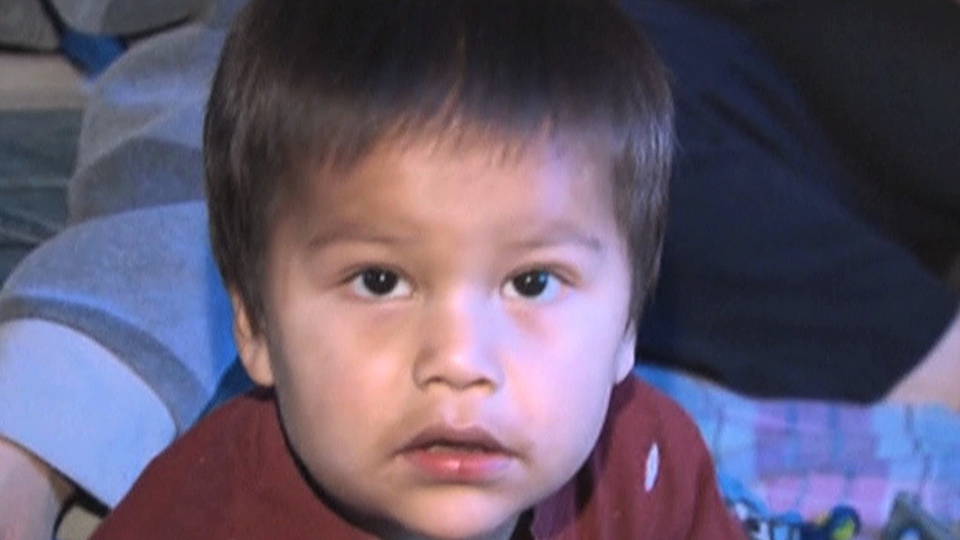
In Canada, a human rights tribunal has issued a major ruling on the rights of indigenous people, known as First Nations. The ruling says the government has discriminated against First Nations children by providing significantly less funding for child welfare services on reserves. The underfunding of services disproportionately pushed First Nations children into the custody of the government’s child welfare system. For many, this recalls the century-long practice by the Canadian government of forcing First Nations children into boarding schools aimed at stripping them of their indigenous heritage. Cindy Blackstock of the First Nations Child and Family Caring Society spoke after Tuesday’s ruling.
Cindy Blackstock: "Don’t you think that the one thing we can get in reconciliation right is raising a generation of First Nations children that don’t have to recover from their childhoods anymore?"
New Rules Lift Restrictions on U.S. Exports to Cuba

Washington has announced new rules to continue to normalize relations between the United States and Cuba. The measures will lifts restrictions on U.S. financing for exports to Cuba and allow the direct shipping of many products. Previously, U.S. exports had to be routed through a third country before reaching Cuba, and the shipments had to be paid for in advance with cash. The new measures, slated to take effect today, also extend rules allowing for increased travel. President Obama says he is looking to travel to Cuba before the end of his term next year.
U.N. Syria Envoy Sends Out Invitations for Geneva Peace Talks

The United Nations Syria envoy has sent out invitations for Friday’s scheduled peace talks aimed at easing the devastation of the ongoing war in Syria. It is not yet clear who will attend the talks and which factions will represent the opposition. This comes as two bomb blasts killed at least 19 people in Homs.
France: Justice Minister Resigns over Proposed Antiterrorism Laws
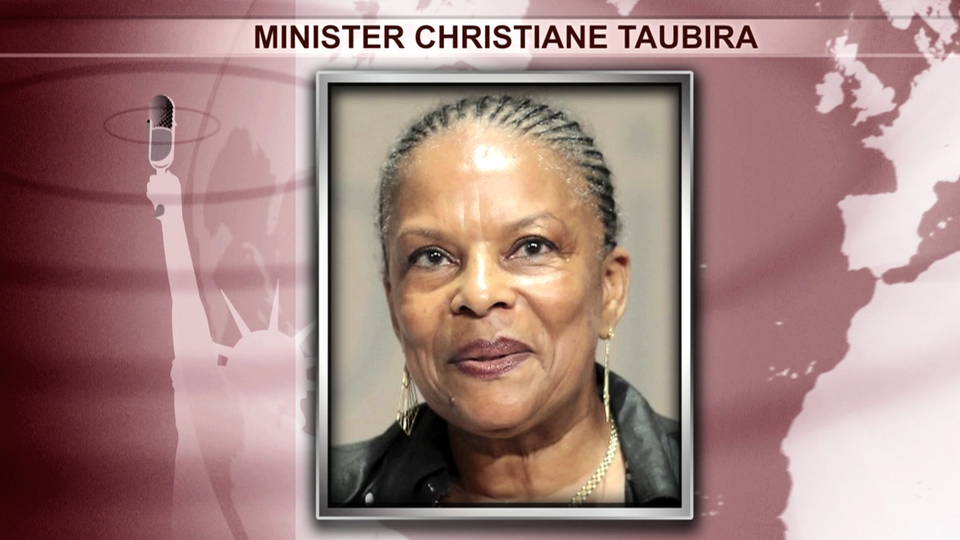
In France, Justice Minister Christiane Taubira has resigned in protest over plans to strip people convicted of terrorism of their citizenship. The steps, set to go before Parliament, were proposed in the wake of the November 13 attacks in Paris that killed 130 people. Taubira, one of France’s few top black politicians, tweeted: "Sometimes staying on is resisting, sometimes resisting means leaving."
Trump Says He'll Skip GOP Debate Because Megyn Kelly Is Moderating

In news from the campaign trail, Republican presidential candidate Donald Trump says he will probably not participate in Thursday’s Fox News-hosted debate. This comes after Trump spent days demanding Fox remove anchor Megyn Kelly as one of the debate moderators—a demand that Fox refused to meet. In August, during the first GOP debate, Kelly asked Trump about his history of calling women "fat pigs, dogs, slobs and disgusting animals." After the debate, Trump criticized Kelly, saying, "She starts asking me all sorts of ridiculous questions. And, you know, you could see there was blood coming out of her eyes, blood coming out of her, wherever."
Ohio: Schools Closed in Sebring Amid High Lead Levels in Water

In Sebring, Ohio, schools were closed for the third day in a row after tests showed high levels of lead in the drinking water. Pregnant women and children have been told not to drink the water. State officials are sending bottled water and testing kits to the small village, which has about 4,300 residents. The state Environmental Protection Agency says the operator of the small water system submitted false reports to cover up the high levels of lead.
Flint Residents Protest Receiving Bills for Poisoned Water

Meanwhile, in Flint, Michigan, residents are protesting the fact that they are still receiving water bills for the lead-poisoned water. The contamination crisis began after the state-appointed, unelected emergency manager of Flint switched the source of the city’s drinking water to the corrosive Flint River in a bid to save money. On Tuesday, resident Melissa Mays spoke out.
Melissa Mays: "We’re still receiving bills for tainted water. It’s ridiculous. Not only are we receiving bills, our bills have gone up. The average now is around $200 a month for tainted water. And it needs to stop."
San Francisco: 16 People Arrested Protesting ICE Raids
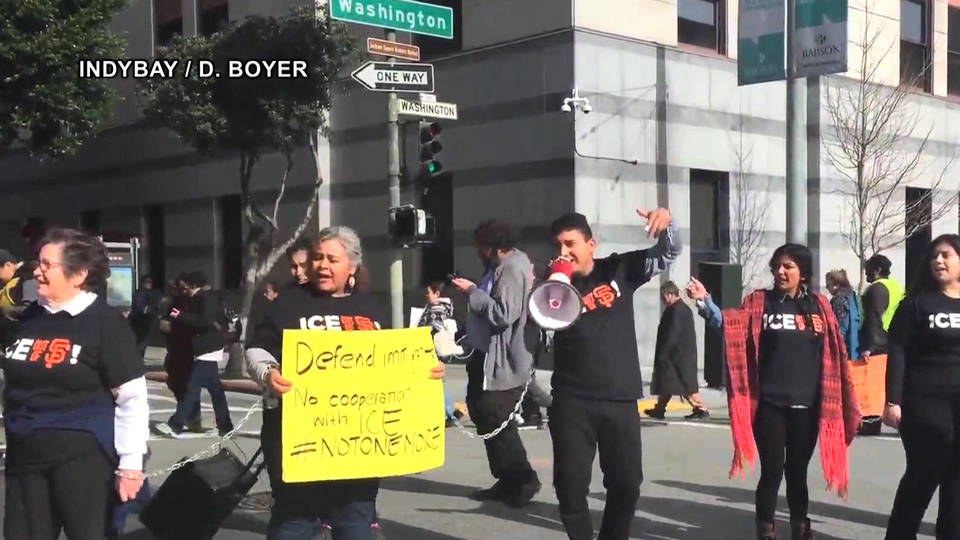
In San Francisco, 16 people were arrested after blocking the streets around the Immigration and Customs Enforcement building Tuesday. Ten of the protesters chained themselves together to block traffic. The action was held to protest the new round of raids against Central American families. The raids have targeted people who have sought asylum in the United States after fleeing violence in their home countries.
New York: 11 Veterans Arrested Protesting Gas Storage Facility
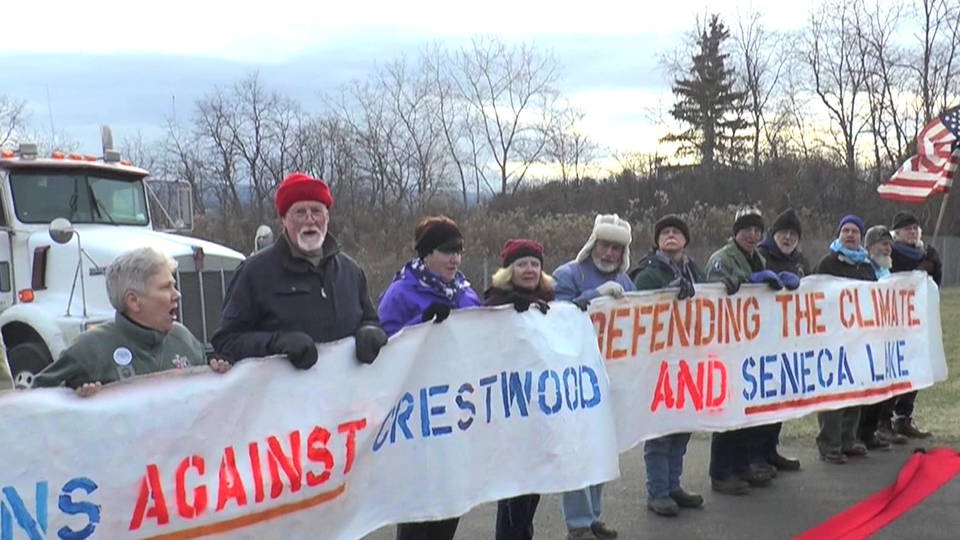
Meanwhile, in upstate New York, 11 U.S. military veterans have been arrested after forming a human barricade to block traffic at a natural gas storage facility. The protest was part of an ongoing campaign to stop Crestwood Midstream from expanding gas storage in abandoned salt caverns at Seneca Lake, a drinking water source for 100,000 people. Retired U.S. Air Force Sergeant Colleen Boland spoke out at Tuesday’s protest.
Colleen Boland: "While on active duty, I traveled to over 20 countries, many of them places where drinking water was scarce, made children sick, fueled conflict and threatened security. I bring those experiences with me to the gates of Crestwood, where for 16 months now I’ve been peacefully protesting a plan to store highly pressurized and volatile fossil fuels below this beautiful lake, a source of drinking water for 100,000 people."
Peruvian Indigenous Activist Featured in New Doc Barred from Coming to U.S. for Sundance Premiere
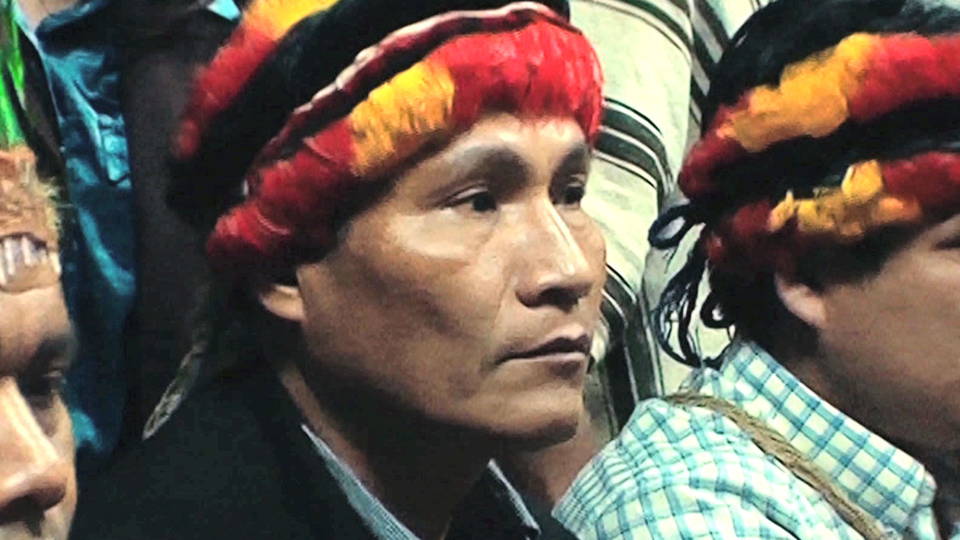
And a leading indigenous environmental activist in Peru has been barred from entering the United States. Alberto Pizango was supposed to come to Park City, Utah, for the Sundance Film Festival, where he is the subject of the new film "When Two Worlds Collide." It chronicles indigenous resistance to Peruvian laws aimed at opening Amazonian land to mining, logging and oil extraction. On June 5, 2009, a crackdown on the protests left dozens of people dead, including indigenous people and police. Pizango faces life in prison for the fatal clash—even though he wasn’t there when it took place. Late last week, he was blocked from boarding his flight to come to Sundance. He went to the U.S. Embassy, where he was told his U.S. visa had been revoked. He has not been told why.
Donate today:
Follow:

1/29 Park City, UT
WORK WITH DN!

Director of Finance and Operations
Director of Development
---------------------
207 West 25th Street, 11th Floor
New York, New York 10001, United States
---------------------
---------------------





No comments:
Post a Comment